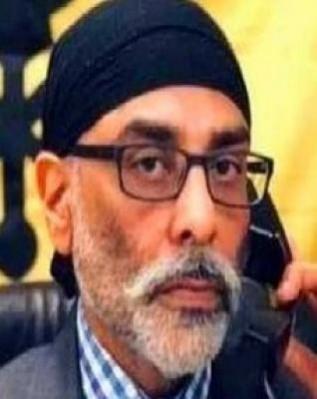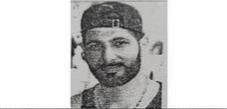Canada-based pro-Khalistan hardliner Hardeep Singh Nijjar, who was declared a 'wanted terrorist' by the Indian government and was shot dead by two unidentified gunmen on the premises of Guru Nanak Sikh Gurdwara, of which he was the head, in the Punjabi-dominated Surrey city of Canada was among many of the Khalistani terrorists who are based out of India.
Officials admit to IANS like Nijjar, who was the Khalistan Tiger Force chief, several pro-Khalistan leaders are carrying out separatist activities from Canada, Britain and Australia, where a sizable Sikh diaspora is residing, besides Pakistan.
Among them, the prominent on the radar of the National Investigating Agency (NIA) are proscribed terrorist organisation, Sikhs For Justice (SFJ), founded by Gurpatwant Singh Pannun, who is now operating from Canada, and Lakhbir Singh Sandhu, alias Landa, and Harwinder Singh Sandhu, alias Rinda, both ISI-backed operatives promoting the terror activities of Babbar Khalsa International (BKI) in India.
According to the NIA, both Pakistan-based Rinda and Linda are wanted in cases relating to commissioning of targeted killings, as well as targeting of law enforcement agencies in order to create an environment of terror in Punjab.

Rinda is a "listed individual terrorist" and a Babbar Khalsa International (BKI) member. He's originally a resident of Maharashtra's Nanded, with Punjab's Taran Tarn district as a permanent address. Landa is also a resident of Tarn Taran.
The NIA investigations have shown that they have been engaged in recruiting new members for the BKI by promising them monetary benefits. They have also established a network of operatives in various countries to further their terror activities in India.
A latest video showed Pannun openly asking Hindus from Canada to "go back to India".
Former Pentagon official Michael Rubin has censured Canadian Prime Minister Justin Trudeau for alleging India had links with the killing of Nijjar and claimed that the Khalistani extremist "was not simply a plumber" and "he had blood on his hands".
The high-profile killing of Nijjar, whose killing sparks a huge diplomatic row between New Delhi and Ottawa, comes days after another UK-based outfit chief Avtar Singh Khanda died under mysterious circumstances in a hospital.
Khanda, who is believed to have trained Khalistani separatist and Waris Punjab De chief Amritpal Singh, now jailed, after the death of Deep Sidhu, was the face of the protests at the Indian High Commission in London.
Both Nijjar and Khanda, blamed to collect charity for terrorism in the name of human rights violations against the Sikh community by spewing venom, were involved in radicalising Sikh youth and close to other KLF leaders like Jagtar Singh Tara and Paramjit Singh Pamma.
Khanda's father was a KLF terrorist who was gunned down by security forces in 1991 and his mother was related to another KLF terrorist Gurjant Singh Budhsingwala with links to Pakistan.
In May, wanted terrorist in India and Khalistan Commando Force (KCF) chief Paramjit Singh Panjwar, 63, was shot dead by unidentified gunmen near his residence in Pakistan's Lahore.
Panjwar, along with his guard, was in a park when two assailants opened fire at them and fled on a motorcycle.
Both Panjwar and Nijjer were designated as terrorists by India under the Unlawful Activities (Prevention) Act in July 2020.

Nijjar was accused of killing Ripudaman Singh Malik, the man who was acquitted in the 1985 Air India terrorist bombing case, in Surrey last year. It is believed that Malik was killed as a result of internal gang war between Khalistani groups.
He was expressing apprehensions that he might get killed by his Khalistani rivals.
India had asked the Canadian authorities on several occasions to take action against Nijjar for his alleged involvement in terrorist acts in Punjab.
Last year the Punjab Police had sought the extradition of Nijjar as he was wanted in cases related to acts of reviving terrorism in the state.
The police were demanding his extradition in pursuance of a lookout circular (LOC) issued on January 23, 2015, and a red corner notice issued on March 14, 2016.
The NIA said Nijjar had been proactively involved in recruiting, training, financing and operationalising pro-Khalistan terrorist modules for spreading terror in India. He was involved in giving inflammatory and hateful speeches through social media platforms.
A cash reward of Rs 10 lakh was declared against Nijjar, who had close ties with the Sikhs For Justice (SFJ).
Despite the SFJ being a banned organisation in India since 2019 on grounds of secessionism and Pannu being declared a terrorist, countries like Canada, the UK and the US, with a sizable Sikh diaspora, have allowed the organisation to conduct anti-India activities, including holding illegal referendums to build a campaign for secession of Punjab.
The Western countries don't see it as a crime to prosecute Pannun and other hardliners as they think it will be a violation of the freedom of expression, a police official told IANS.
(With inputs from IANS)

















